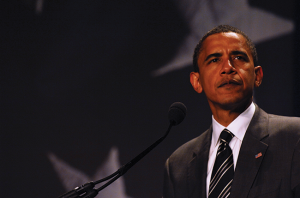POTUS at the Bully Pulpit
 Tech. Sgt. Dawn M. Price, USAF (Public domain)
Tech. Sgt. Dawn M. Price, USAF (Public domain) On June 26 President Barack Obama delivered the eulogy for Rev. Clementa Pinckney at the Emanuel African Methodist Episcopal Church in Charleston, South Carolina, where Pinckney and eight others had been gunned down by a racist thug nine days earlier. I have never felt more proud of a president for whom I’ve cast my ballot.
Try, if you can, to imagine any of the current Republican presidential contenders stepping up to offer an appropriate tribute on that occasion. Picture them, in turn, breaking into “Amazing Grace.” See it in your mind’s eye: Jeb Bush. Ben Carson. Chris Christie. Ted Cruz. Carly Fiorina. Rand Paul. Scott Walker. Donald Trump. Each more dreadful than the next. Obama, by contrast, rose to the moment majestically. Only someone of high moral stature and deeply steeped in the locutions, cadences, history, and spirit of the black church could have brought to that occasion the resonance it deserved, and evoked from it such grandeur and grace. The president gave a pitch-perfect, note-perfect performance—one for the history books, one for the ages, one that people will study as a masterpiece of artful theater combined with rhetorical suasion, weaving together so many disparate cultural threads, making of them a tapestry that both maps where we are and shows where we need to go.
If, on August 28, 1963, Martin Luther King Jr. had gospel singer Mahalia Jackson seated beside him on the steps of the Lincoln Memorial, instructing him to “Tell them about the dream, Martin,” that same spirit surely hovered around Obama, whispering the same advice into his ear as he re-drafted the eulogy, perhaps in the Oval Office, and as he delivered the words that June day in Charleston. And who could resist the potent symbolism of the hymn “Amazing Grace,” written by the repentant former captain of a slave ship, the English poet and clergyman John Newton?
And yet, I can’t help but note that this cultural moment, including Obama’s preacherly role therein, reinforces the faith-based mentality of Christian believers of all races. Because it was, in good part, a sermon, aimed at the amen corner and received there as such. Noting that the accused killer, Dylann Roof, had hoped to foment racial tension and inspire fear, Obama said, “Oh, but God works in mysterious ways. God has different ideas. He didn’t know he was being used by God.” This was met with enthusiastic applause from the AME church dignitaries surrounding the president on stage, as well as from the audience.
I don’t claim insight into whether or not Obama actually believes in God, believes in the Bible’s contents as literal truth or takes them as metaphorical guidance. I see him as a pragmatist who, whatever he may hold in his heart, knows full well that you can’t get elected dogcatcher in most parts of this country—and certainly not to high office—without professing belief in Judeo-Christian mythology. This is most easily accomplished by closing any formal public appearance with the line: “God bless you all, and God bless the United States of America.”
If Obama was merely paying lip service to faith-based culture that day, I couldn’t blame him for doing so. The context made it virtually unavoidable. I would like to think he knows better. But it doesn’t really matter. Because I have no respect for the belief system on which he called for his rationalization of Dylann Roof’s murderous rage and its outcome. “God works in mysterious ways,” he said. I fail to see any consolation therein, and I think less of others for buying into this balderdash, just as they think less of me for disbelieving it (though doubtless some of them “forgive” me for that sin).
In a blog post earlier this year I wrote, “As an equal-opportunity infidel, I find all religious belief systems ridiculous and benighted, making no exception for Islam.” And no exception for Judeo-Christianity either. On this I’m with Sam Harris (The End of Faith: Religion, Terror, and the Future of Reason, 2004) and Ta-Nehisi Coates (Between the World and Me, 2015): Faith is not the solution; faith is the problem. The short-term “healing” effected by Obama’s sermonizing will only have the long-term consequence of reinforcing faith-based irrationality throughout Christendom, and I consider that a bad thing.
In his 2006 book, The Triumph of the Therapeutic: Uses of Faith after Freud, Philip Rieff argues that the founder of psychoanalysis famously disowned such disciples as Jung and Reich on the grounds that they perverted the discipline’s analytic premise in order to provide therapy — “healing”—in place of understanding and awareness. Thereby they transmuted what Freud intended as an antidote to religion into a secular variant of the toxin. (Rieff intended the title of his book ironically; a Freudian himself, he despised those who subverted the true goal of their profession.)
Or as Goya wrote, the sleep of reason produces monsters. Religion, by definition, anesthetizes reason, and those who believe the application of compassionate reason is the best way to help others should point out such anesthetization whenever it occurs, especially when everyone’s watching. © COPYRIGHT 2015, A. D. COLEMAN.
